Key takeaways:
- Independent publishing provides creative freedom, requiring a balance between artistic expression and business knowledge.
- A publishing contract is essential for defining rights, royalties, and responsibilities, protecting authors from exploitation.
- Clarity and confidence in contractual negotiations are crucial, enabling authors to advocate effectively for their needs.
- Documenting agreements and taking time to understand terms can prevent potential pitfalls and ensure informed decision-making.
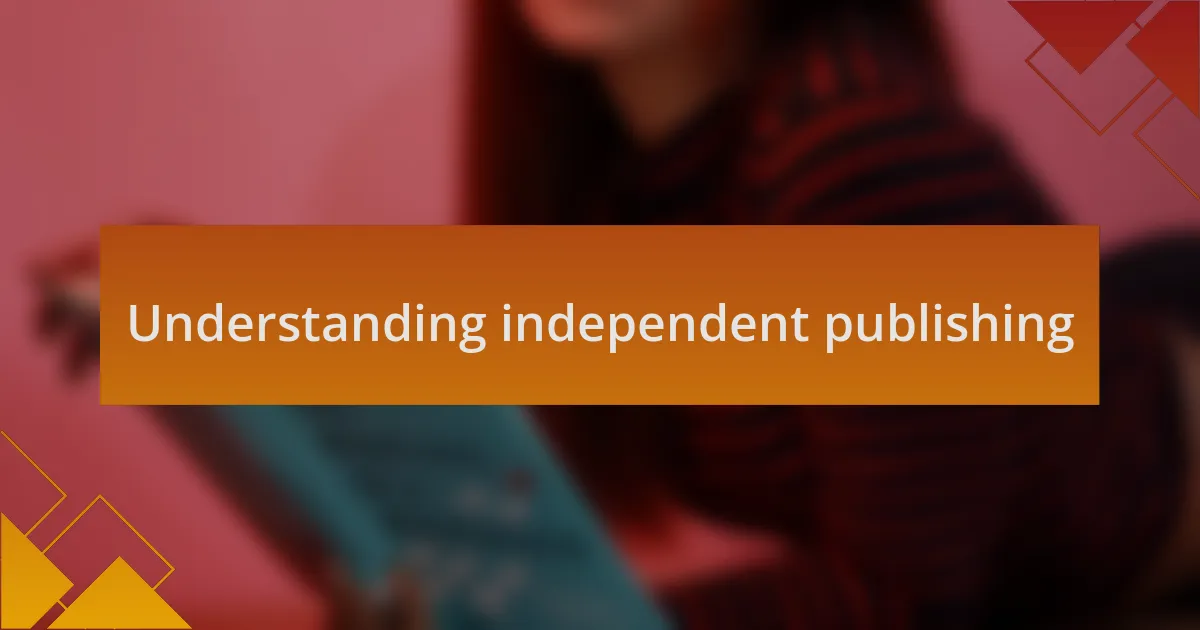
Understanding independent publishing
Independent publishing offers authors an incredible degree of control over their work. When I first entered this realm, I was both exhilarated and nervous about the creative freedom it provided. Have you ever pondered the feeling of having your vision come to life exactly as you imagined? It’s a powerful experience.
As I dug deeper into independent publishing, I realized it requires more than just creativity; it’s also about understanding the business side of things. Balancing marketing strategies with artistic expression often felt like walking a tightrope. How do you bridge that gap? For me, it involved countless late nights spent learning about distribution channels and pricing models.
I’ve learned that independent publishing is not a one-size-fits-all journey. Each author’s path is uniquely shaped by their goals and resources. I remember connecting with a fellow independent author during a workshop, who candidly shared their ups and downs. It hit me how important community support is in this landscape—it’s a space where we can share victories and offer encouragement along the way.
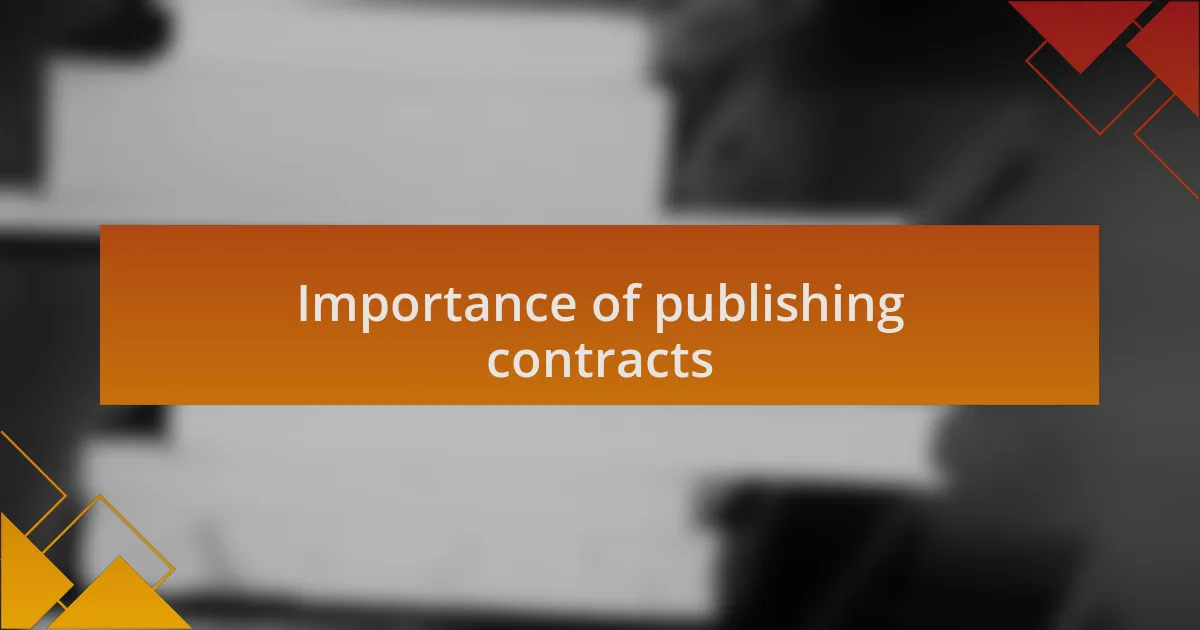
Importance of publishing contracts
A publishing contract serves as the blueprint for the entire publishing process, outlining critical elements like rights, royalties, and responsibilities. I learned this firsthand when I was caught off guard by a clause that restricted my ability to create sequels. It made me realize how vital it is to specify what I want and need in a contract upfront. Have you ever thought about how easily misunderstandings can arise when everything isn’t clearly defined?
Moreover, a well-crafted contract protects authors from potential exploitation. I remember working with a small press that initially seemed supportive but later attempted to retain rights well beyond what was fair. It was a wake-up call, highlighting how essential it is to have a solid agreement in place. In this industry, knowledge is power, and understanding contracts can make all the difference.
Finally, having a publishing contract can enhance an author’s credibility. When I presented my contract to a local bookstore, it established my professionalism and commitment to my work. It’s funny how a piece of paper can influence perceptions so significantly, but it truly does. Have you ever considered how your contractual knowledge could impact your opportunities? It’s all about confidence and clarity in your journey.
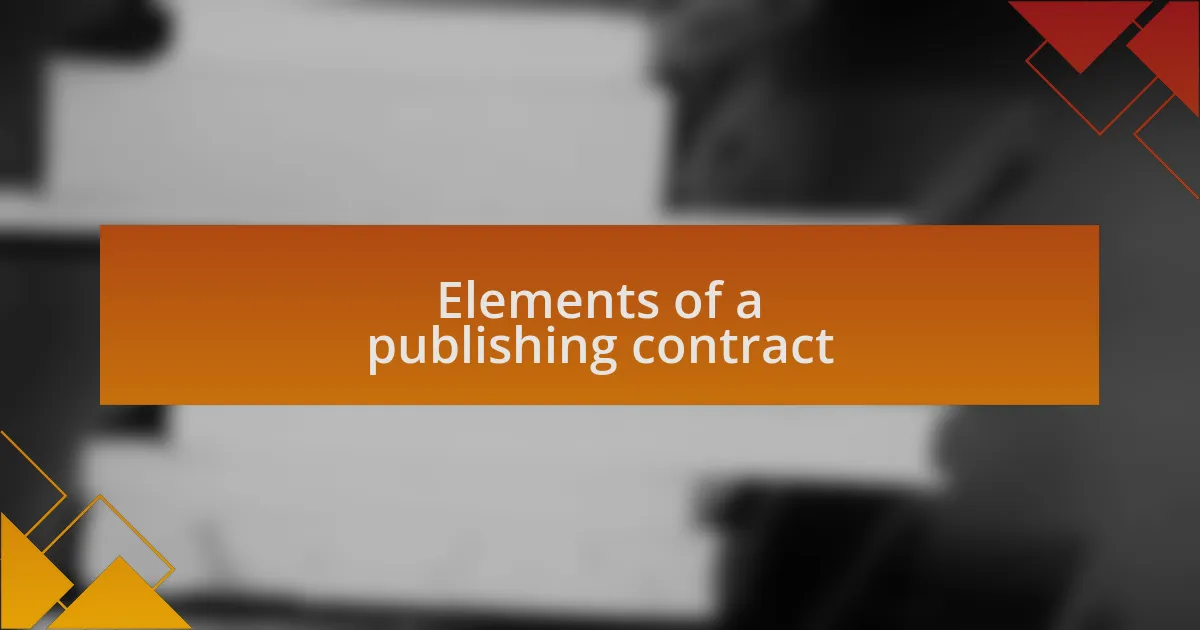
Elements of a publishing contract
When delving into publishing contracts, one of the most critical elements to consider is the rights you retain versus what you’re giving up. I remember my first contract had a clause that transferred all rights for a long period, leaving me uneasy about my creative autonomy. How can an author truly grow if they can’t revisit their earlier works or expand upon them? Negotiating rights can often feel daunting, but clarity here is essential for your literary future.
Royalties are another vital aspect, as they determine how much you’ll earn from your work. I once misread the royalty structure and only realized my mistake when the first payment arrived, and let me tell you, it was a harsh lesson. It made me question; what’s the point of publishing if the financial rewards don’t match the effort? Understanding how royalties are calculated—whether it’s a percentage of sales or advances against royalties—can profoundly affect your income stream, so dissect that section carefully.
Lastly, don’t overlook the responsibilities outlined in your contract. These can range from deadlines for manuscripts to obligations for marketing your book. I vividly recall being overwhelmed by my first deadline, feeling like I was on a tightrope without a net. It’s easy to underestimate the significance of these terms, but knowing what’s expected from you can ease anxiety and ensure a smoother publishing journey. What responsibilities are you willing to take on? Evaluating this upfront can save you from stress later.
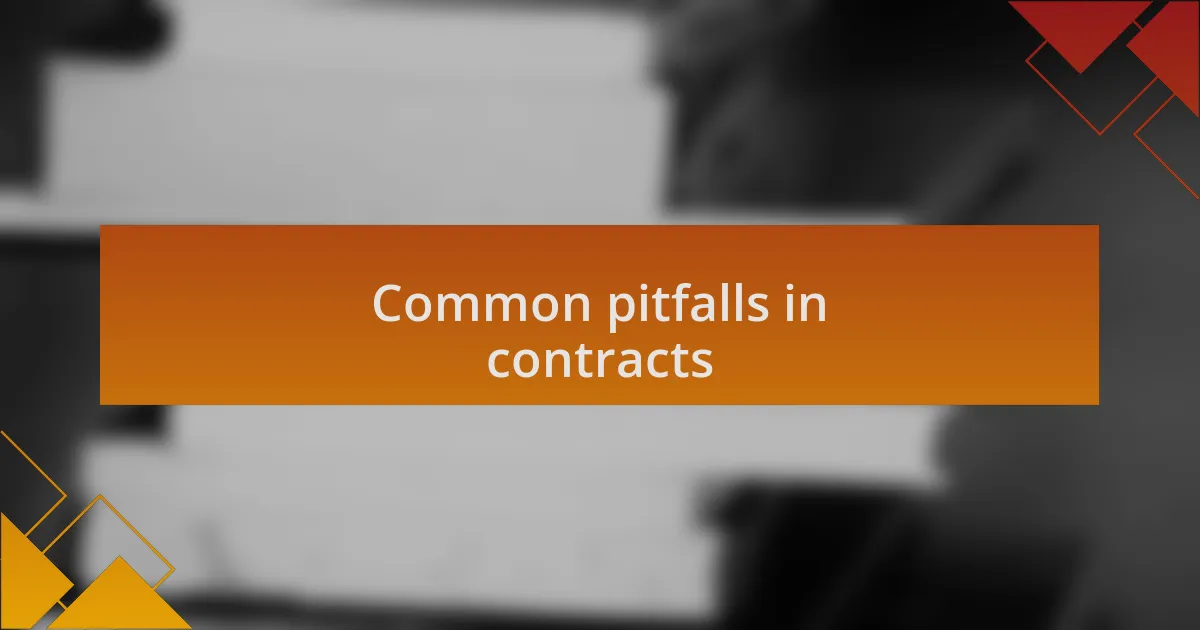
Common pitfalls in contracts
One common pitfall in publishing contracts is the dreaded “perpetuity clause.” I once found myself wrapped up in a contract that granted my publisher the rights indefinitely. It felt like I was signing away my creative legacy without fully grasping the implications. Have you ever thought about how it feels to lose the ability to control your own work? It’s essential to negotiate a timeline for rights reversion that feels fair and allows you the freedom to reclaim your creations later.
Another area where authors often stumble is the intricacies of termination clauses. In my experience, a poorly defined termination clause can leave you feeling trapped. I remember the frustration when I realized I’d be tied to a contract for longer than I anticipated, even if the partnership wasn’t working. Clearly outlining conditions under which either party can exit the agreement not only protects you but also sets clear expectations from the onset. Isn’t it better to have a clear escape route than to feel like you’re in a bad relationship?
Finally, many authors overlook the importance of clarity in marketing obligations. I was caught off guard when I discovered I was supposed to be my own promoter without any guidance. Feeling abandoned isn’t just inconvenient; it can also dampen your enthusiasm. Understanding what the publisher will actually do for your book will give you insights into whether you’re signing up for a partnership or a solo journey with a few supporting players. Having a shared vision of marketing can lead to greater satisfaction on both sides.
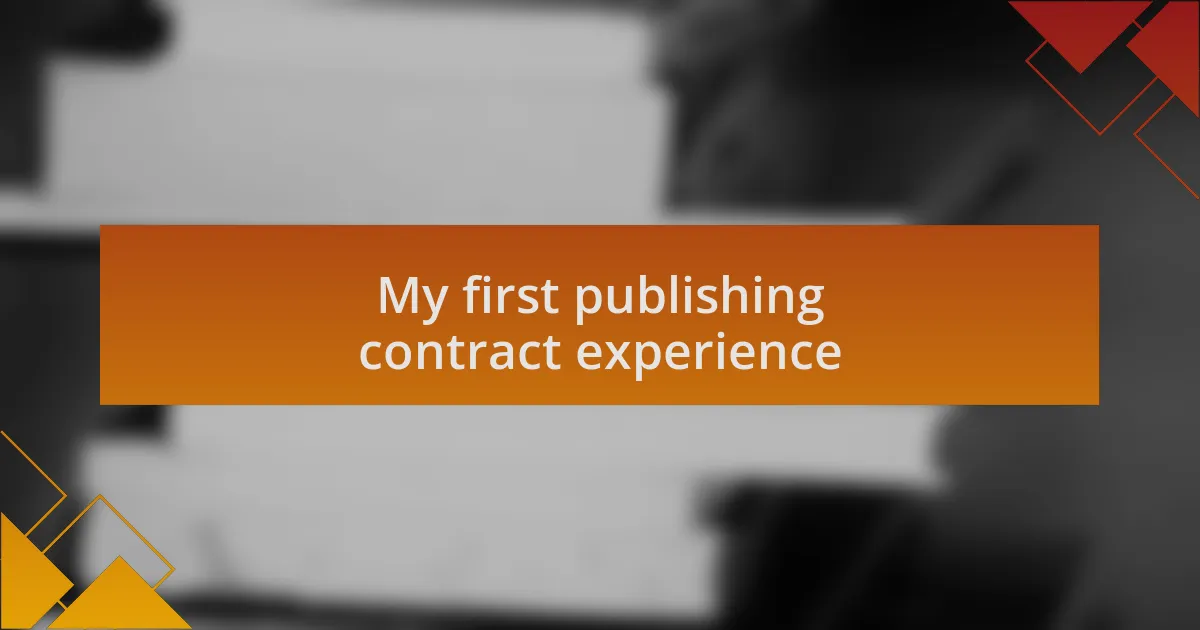
My first publishing contract experience
It was a whirlwind of emotions when I received my first publishing contract. Holding that document, I felt a mix of excitement and anxiety; it was surreal to see my name attached to a legitimate agreement. But let me tell you, the fine print overwhelmed me. I remember sitting at my kitchen table with a cup of tea, scrutinizing every clause while wondering, “Am I really ready for this?”
As I dove deeper into the terms, confusion set in. The language was dense, and I felt a rising panic. How could something so monumental be so complicated? It was only after reaching out to a mentor that the fog began to lift. Their encouragement reminded me that asking questions is a strength, not a weakness. Have you ever faced a situation where seeking clarity transformed your understanding? I realized that navigating contracts is as much about knowing your worth as it is about the legal jargon on the page.
Reflecting now, I wish I had trusted my instincts more. There were moments when I felt pressured to sign quickly, almost like I was grabbing at a fleeting opportunity. But honestly, taking the time to truly understand the terms would have empowered me. It’s essential to remember that a contract is not just a piece of paper; it shapes your career and creative journey. Have you ever paused and considered the long-term implications of your decisions? I learned the hard way that patience and diligence can lead to more fulfilling partnerships.

Negotiating better contract terms
In my experience, negotiating better contract terms often hinges on confidence. I recall a moment when I pushed back against a royalty rate that felt far too low. At first, my hands trembled as I typed my counteroffer, but what I realized was that standing firm on my value not only elevated my stance but also demonstrated my commitment to the work. Have you ever felt that surge of empowerment when you assert your worth?
Another key to successful negotiation is preparation. I learned to come to the table armed with industry standards and examples of what others in similar situations received. This knowledge helped me articulate my position clearly. Have you ever entered a discussion feeling unprepared? That feeling can be intimidating, but the more informed I became, the more comfortable I felt in advocating for my needs.
Finally, I’ve discovered that building rapport can influence the outcome significantly. A friendly, open dialogue often brings about a more favorable agreement. I remember sharing a laugh with an editor during our talks; it humanized the negotiation process. How do you connect with others when you’re discussing something important? Establishing that relationship can turn a tense negotiation into a collaborative conversation, ultimately leading to terms that satisfy both parties.
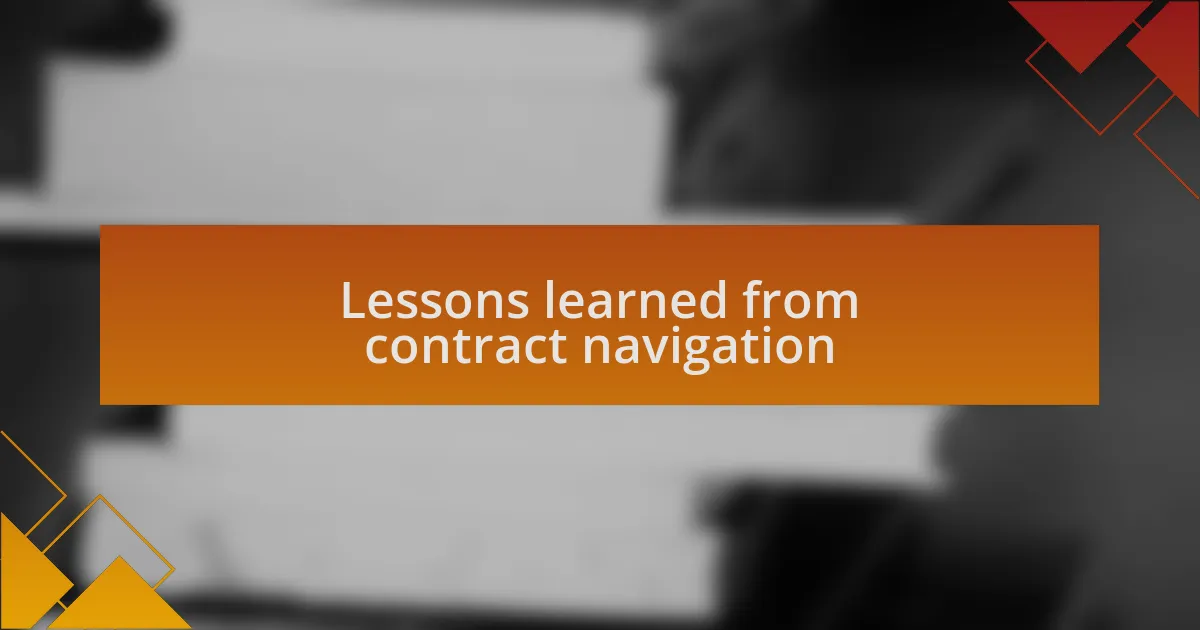
Lessons learned from contract navigation
Navigating publishing contracts has taught me that clarity in communication is crucial. I once found myself puzzled by vague terms that left room for interpretation, making me second-guess my decisions. In that moment, I learned to ask questions—lots of them—without fear. Have you ever been in a situation where clarity could have saved you from confusion? By seeking precise definitions and ensuring we were on the same page, I built a stronger foundation for our agreement.
I also discovered that patience is more valuable than I initially thought. There was a time when I felt the pressure to rush through contract discussions, eager to secure a deal. However, stepping back allowed me to see broader implications, especially when it came to rights and responsibilities. Do you ever feel the urge to hurry through negotiations? Taking my time helped me uncover potential pitfalls that I might have missed otherwise.
Another important lesson was the value of documenting everything. In one instance, I learned the hard way when a verbal agreement was forgotten in later discussions. Now, I approach every conversation with the mindset that if it’s not written down, it doesn’t exist. How do you safeguard your agreements? Maintaining a clear written record not only protects you but also strengthens your position as you move forward in the publishing journey.